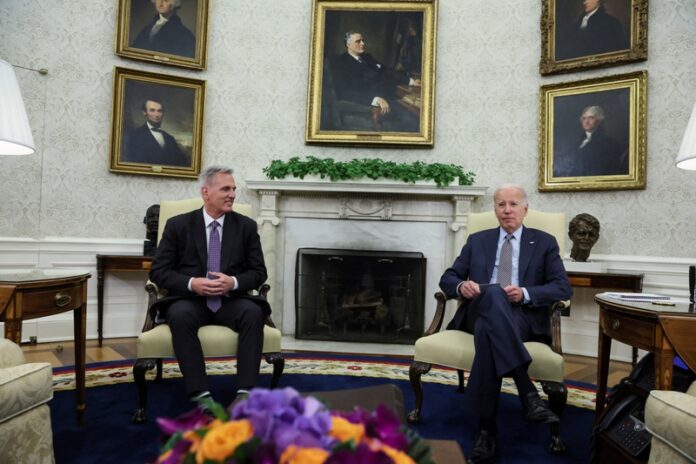Top leaders in both parties reached a long-sought deal on Saturday to avoid an unprecedented government default, announcing an agreement on a plan to lift the debt ceiling for two years and apply new caps on federal spending over the same duration.
To get there, negotiators had to iron out their differences on a small but crucial list of outstanding issues that had dogged the talks in recent days, including lower spending levels, new work requirements for social benefit programs and permitting reforms to expedite approval of energy infrastructure projects — three Republican demands that were opposed by most Democrats.
The impasse became so entrenched Saturday evening that President Biden and Speaker Kevin McCarthy (R-Calif.), who had no plans to speak, staged a break-the-glass phone call in an 11th-hour effort to break the stalemate.
McCarthy said in brief remarks at the Capitol that there’s still some work left to do, but he expects to post the legislative text on Sunday, and stage a floor vote the following Wednesday.
The proposal still faces tall barriers to passage, particularly in the House, where conservatives wasted no time hammering the compromise as a capitulation by McCarthy to Biden — one they say has undermined the deficit reduction goals of Republicans going into the talks. They’re vowing to oppose the measure when it hits the floor.
Still, the agreement marks at least a temporary victory for McCarthy, the new Speaker who has defied the odds in holding his GOP conference together on partisan messaging bills, but has yet to be tested on major, must-pass legislation that can win the backing of Democrats — particularly with the economy on the line.
Under the terms of the deal, Republicans agreed to extend the government’s borrowing authority for two years — pushing the threat of default beyond the 2024 elections, as Biden had demanded, according to a source familiar with the agreement.
In return, the White House agreed to freeze — or accept small cuts — in nondefense spending for 2024, which could affect discretionary programs favored by Democrats. Spending in 2025 would be increased by 1 percent, and no caps would apply in 2026 and beyond, the source indicated.
The agreement also increases the age at which recipients of food stamps must seek work to be eligible for the benefits, from 49 to 54 — a key request of Republicans. But it would also ease work requirements for certain other groups, including veterans and the homeless — changes designed to sweeten the deal for Democrats.
Medicaid, according to the source, would not be affected, nor would Biden’s student loan relief program.
The compromise came on Day 11 of tense negotiations between McCarthy, Biden and their appointed deputies. And it was fueled by a warning from the Treasury Department, issued just a day earlier, that the government would run short of funds to pay down all of its obligations on June 5.
Heading into the final round of talks in the Capitol on Saturday morning, McCarthy expressed confidence that Congress would meet that deadline.
That’s a tall order, given the time crunch and the threats from the Senate to delay the vote in the upper chamber. Still, McCarthy said he would adhere to the promise he made to conservatives in January that the House won’t vote on the package until the legislative text has been finalized and posted for 72 hours to allow lawmakers the time to digest its contents. With the text expected on Sunday, that sets the stage for a Wednesday floor vote.
“Everybody won’t like what is the end of the agreement … on both sides,” McCarthy said Saturday morning. “But … at the end of the day I think people should see what that product is before people vote on it.”
The agreement drew immediate howls from both sides of the aisle, with liberals protesting that the spending cuts are too sharp and conservatives objecting that they’re not sharp enough.
Those criticisms came as no surprise: A bipartisan compromise able to win endorsements from McCarthy and Biden was always expected to alienate the ideological edges of each party. The challenge now facing party leaders — not only McCarthy, but also House Minority Leader Hakeem Jeffries (D-N.Y.) — is in rallying enough support on both sides to cobble together a bipartisan majority and send the package to the Senate.
That challenge is particularly acute for McCarthy, who struggled to win the Speakership in January in the face of conservative opposition, and has been under heavy pressure from his right flank to hold the line in the debt ceiling talks. If conservative anger with the debt ceiling deal bubbles up enough, it could prompt an effort to rescind his gavel — a process made easier by the rule changes in January.
House Republicans had passed a partisan debt ceiling bill through the lower chamber last month, which included roughly $4.8 trillion in deficit reduction and rescinded a number of Biden-era programs, including green-energy tax credits, student-loan subsidies, and $80 billion in IRS funding.
But GOP negotiators dropped most of those provisions during the course of the talks in order to secure the new spending caps. And even before the deal was announced, the Freedom Caucus was blasting the proposal for giving away too much to Biden.
The conservatives are pointing to one major point of contention: The debt ceiling hike in their legislation was capped at $1.5 trillion, while the deal McCarthy cut with Biden was expected to be nearly three times that figure.
“Unacceptable,” the Freedom Caucus tweeted.
Rep. Dan Bishop (R-N.C.) took the criticisms a long step further, saying a debt ceiling increase of that size would prompt “war” between conservatives and leadership.
“If [the] Speaker’s negotiators bring back in substance a clean debt limit increase … one so large that it even protects Biden from the issue in the presidential …, it’s war,” Bishop tweeted.
Despite the conservative criticisms, Republicans clearly won the debate in one important sense: Unlike debt ceiling fights in the past — when GOP leaders demanded spending cuts but conceded tax hikes to Democrats in return — McCarthy drew a red line on new revenues early in the process, focusing the deficit reduction effort squarely on only the spending side of the budget equation in what amounts to a major victory for Republicans.
The absence of tax hikes as part of the deal has infuriated Democrats, who are lamenting the lopsided nature of the talks. But it could provide McCarthy some cover as he faces a barrage of criticism from his far-right skeptics.
“I’m not fearful of what’s in this bill,” he said.
Rep. Tom Emmer (R-Minn.), the Republican whip, has not been directly involved in the talks. But he was in the Capitol on Saturday to reveal that GOP leaders are already reaching out to the early conservative critics in an effort to assuage their concerns.
“We are constantly in touch with our members letting them know that what is being reported you should not accept,” he said before the deal was announced. “Don’t believe what you’re reading until you get it from us.”
Despite the high stakes — and the evident exhaustion in the faces of the negotiators — there were light moments down the final stretch, as well.
Rep. Patrick McHenry (R-N.C.), chairman of the Financial Services Committee and one of the top GOP negotiators, kept reporters updated on the birthday parties his kids were attending, and their culinary preferences.
“The kids had French Toast,” he said while entering the Capitol on Saturday morning. “I didn’t get any.”
Several hours later, all three GOP negotiators — McCarthy, McHenry and Rep. Garret Graves (R-La.) — left the building to pick up lunch at Chipotle. Their fetch included countless bags of chips and tubs of queso, which they left for the dozens of reporters staking out the talks.
Later still, McCarthy staffers hauled from the office a miniature canoe, filled with ice, sodas and bottles of water — also for the benefit of reporters. But the endeavor suffered a few setbacks.
First, the tourists roaming through the Capitol picked the vessel clean. When the aides restocked, and moved the craft out of the tourist stream, it sprung a leak as the ice melted.
“A metaphor for the day,” one reporter observed.
The Hill’s Brett Samuels contributed to this report. / The Hill / photo: reuters














